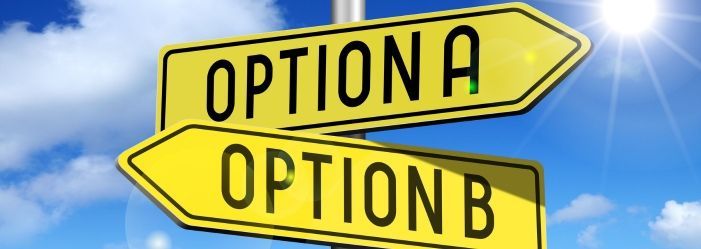Last Updated: March 19, 2024
Look at Your Loan Options

Disclaimer: We are not qualified legal or tax professionals and are not giving advice. Always speak with a qualified professional before making any legal or financial decisions.
Beginning the journey to secure a loan without an established credit history can be daunting, but it's far from impossible. Whether you're looking to finance a personal project or simply start building your credit, understanding your options is the first step.
This guide will walk you through the essentials of personal loans, the significance of credit history, and practical alternatives for those with no credit.
By the end, you'll be equipped with the knowledge to navigate your financial options confidently.
Prefer to talk to a debt specialist immediately? Click here for a free consultation.
Co-Signer
If you know someone with a good credit rating, you can ask them to co-sign on a loan. This allows you to use their rating to get better terms. In addition, repaying the loan will show up favorably on your credit history.
This option should not be entered into lightly. If you fail to pay back the loan, your co-signer is liable for the full amount and your failure to pay will damage their credit rating. Only co-sign if both of you can afford to take the risk that you will default.
If you decide against this option, how do you get a loan with no credit history and no cosigner?
Family and Friends
If you have friends or family who can afford to lend you money, you can set up formal (with a legal document agreeing on repayment terms) or informal repayment agreements. There are several issues with this. First, nothing is reported to credit agencies and so you are not building a credit history. The second is that many relationships have been ruined by lending and borrowing. And the third is finding someone who is comfortable lending money and has enough money to lend. As with co-signing, enter into this sort of agreement with great caution.
Banks and Credit Unions
The most common place to get a loan is your local bank or credit union. Banks are for-profit institutions and will take a hard look at your credit history. Credit unions are not-for-profit and may have more flexible criteria for lending money. It helps to have an established relationship (a checking account, for instance) with either the bank or the credit union where they can look at your account balance and spending habits.
Online Lenders
Online lenders are similar to banks and credit unions but may have better options. You can also look at P2P(peer-to-peer) lenders who are individuals or groups willing to lend money with fewer restrictions.
Online lenders like P2P will be more flexible than traditional banks and will look at other criteria such as your GPA or current job to decide whether or not to lend money.
Credit-Builder Loans
If you have time to wait, a credit-builder loan may be an excellent option. With this type of loan, you borrow a set amount of money that is then placed in a savings account. After you pay the loan back, you get the loan plus the interest to use as you need. Your repayment of the loan will be reported to credit agencies and help to create a credit report.
The secret to this is to make payments on time! Otherwise, your poor repayment history will negatively impact your credit score. The one drawback to this type of no-credit loan is that you must wait until you have repaid the loan in order to have the money.
Collateral or Secured Loans
A secured loan or collateral loan requires you to put up an object of value that guarantees that you will repay the loan or the item is forfeited to the lender. This loan requires you to have something of value that you are willing to lose.
Financial institutions offer secured loans. However, you want to avoid car title loans! These are often offered by predatory lenders. You will end up paying extremely high interest rates (up to 400%) which makes the loan an extremely stupid idea. Also, you risk losing your car! For most people, their car is their way to get to work. If you lose your car, the consequences can snowball and you may lose everything else. Only put up something you can afford to lose.
Secured Credit Cards
A secured credit card has a credit limit set at the amount of money you are using to secure the credit card. For instance, if you have $300 set aside to secure the credit card, your credit limit is $300. You can borrow up to $300 and then as you repay the amount, you can reuse it up to that amount.
Secured credit cards are a great way to build a good credit history, as long as you make on-time payments!
Payday Loans
Along with car title loans, payday advances are predatory loans. You are charged exorbitant interest rates over a very short repayment period. Do not use payday loans. There are better options available.
If you must have money immediately, check with a credit union for payday alternative loans. These are small loans that may not require a credit check. The fees and interest rates are capped so you will not end up paying the usurious rates charged by payday lenders. The repayment terms are also more generous and range from one to twelve months.
Paycheck Advances
Some employers offer paycheck advances. You borrow money that is then deducted from future paychecks. All employees have the option to borrow money at the same interest rates and terms. These paycheck advances are also reported to credit agencies.
As long as you can afford the future deductions from your paycheck and the repayment terms and fees are favorable, this may be a great option loan for people with no credit.
Personal Loans for Bad Credit and No Credit Loans
Financial institutions may offer personal loans for bad credit or personal loans with no credit. Some have no credit check loans. Because the lender is taking a risk on either known bad credit history or no credit history, these loans have higher interest rates.
Always read and understand the terms. No credit check loans can very easily slide into payday loan type loans with extremely high interest rates and unfavorable repayment terms.
Social Assistance
If you qualify for social assistance, such as SNAP, housing assistance, welfare, local food banks, or CHIP (children’s health insurance), you may be able to free up enough cash to help out a little. Even if you aren’t sure you qualify, it is worth looking into these and other programs.
Credit History
We’ve mentioned repaying loans on time as one way to build good credit. The act of making on-time loan payments is the single most important factor in building a good credit rating. Thirty-five percent of your score is based on your repayment history. Always make your payments on time!
Latest Debt Statistics and Trends
According to the Consumer Financial Protection Bureau (CFPB), total household debt recently surpassed $16 trillion.
Here are some other key statistics and trends to know:
- Average credit card debt per household now exceeds $8,000
- Student loan debt totals over $1.5 trillion across 43 million borrowers
- Late mortgage and debt payments are on the rise, signaling coming trouble
FAQs
Pacific Debt, Inc
Pacific Debt, Inc is an award-winning debt settlement company. If you’d like more information on how to get out of debt, we are happy to help. We will explain all your options and help you decide which is the best option for you. We can even refer you to trusted partners who can better meet your needs.
If you have more questions, contact one of our debt specialists today. The initial consultation is free, and our debt experts will explain your options to you.
*Disclaimer: Pacific Debt Relief explicitly states that it is not a credit repair organization, and its program does not aim to improve individuals' credit scores. The information provided here is intended solely for educational purposes, aiding consumers in making informed decisions regarding credit and debt matters. The content does not constitute legal or financial advice. Pacific Debt Relief strongly advises individuals to seek the counsel of qualified professionals before undertaking any legal or financial actions.
✔ Accredited by Better Business Bureau with BBB A+ rating (4.93 rating and 1678 reviews)
✔ US News and World Reports and Bankrate ranked Pacific Debt Relief as one of “The Best Debt Relief Companies of 2024”
✔ 6.9 star rating by BestCompany.com (over 2379 client reviews)
✔ 4.8 star rating by TrustPilot based (over 1613 verified consumer reviews)
✔ ConsumerAffairs.com Accredited (over 544 verified reviews with an average rating of 5 stars)
✔ A Top 10 Rated Compan by TopTenReviews.com , ConsumersAdvocate.com and Top10debtconsolidation.com
✔ 4.6 star rating by Google (229 client reviews)
✔ 100% rating by SuperMoney (9 client reviews)
Reduce Your Credit Card Debt By Up to Half

BBB Reviews | 4.9/5.0 Rating









 Do Not Sell My Personal Information
Do Not Sell My Personal Information